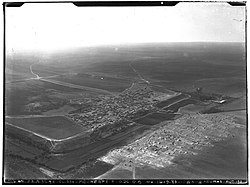Al-Mushrifah
Al-Mushrifah المشرفة Al-Mishirfeh | |
|---|---|
 1936 aerial view of Al-Mushrifah | |
| Coordinates: 34°50′04″N 36°51′03″E / 34.834479°N 36.850971°E | |
| Country | |
| Governorate | Homs |
| District | Homs |
| Subdistrict | Ayn al-Niser |
| Population (2004) | |
• Total | 14,868 |
| Time zone | UTC+3 (EET) |
| • Summer (DST) | UTC+2 (EEST) |
Al-Mushrifah (Arabic: المشرفة, also spelled al-Mishirfeh, el-Mishrife or Musharrfeh) is a village in central Syria, administratively part of the Homs Governorate, located northeast of Homs, with a population of 14,868 in 2004. Nearby localities include Ayn al-Niser, Umm al-Amad and al-Mukharram to the east, and Talbiseh, al-Ghantu and Teir Maalah to the west. Outside the modern town is Tell el-Mishrife, the site of the ancient city-state of Qatna. It has a religiously mixed population of Sunni Muslims, Alawites and Christians. The village contains several mosques and two churches.[1]
History
In the mid-19th century, the village of al-Mushrifah was built within the ancient site of Qatna (Tell al-Mishrifeh).[2] Houses were built on top of the royal palace floors, which caused some damage to them while also providing a protective cover for the underlying ruins.[3] In 1940, its population was 1,500.[4] In the 1950s, under the influence of the Syrian Communist Party, some of the peasants of al-Mushrifah rose against their landlord by seizing his harvest.[5] In 1982, the Syrian Directorate-General of Antiquities and Museums resettled the inhabitants in a new village next to the ancient tell, making the site available for modern archaeological research.[3]
References
- ^ Halabi, Alaa (2015-01-04). "Battles continue in Homs countryside". As-Safir. Al-Monitor.
- ^ Morandi Bonacossi 2005, p. 34.
- ^ a b Abdulrahman et al. 2016, p. 556.
- ^ Toma, Amar (8 September 2012). "Al-Mushrifa: The Village of History and Coexistence". e-Syria (in Arabic). Retrieved 2 January 2025.
- ^ Batatu 1999, p. 121.
Bibliography
- Abdulrahman, Ammar; Luciani, Marta; Morandi Bonacossi, Daniele; Novák, Mirko; Pfälzner, Peter (2016). "The Syrian-Italian-German Mission at Tall Mishrife/ Qatna: Results of the First Season in 1999". In Thuesen, Ingolf (ed.). Proceedings of the 2nd International Congress on the Archaeology of the Ancient Near East 22–26 May 2000, Copenhagen. Vol. 1: The Environment. Images of Gods and Humans. The Tell. Excavation Reports and Summaries Varia (Chronology, Technology, Artifacts). Department of History and Cultures, University of Bologna / Eisenbrauns. ISBN 978-8-861-13007-4.
- Batatu, Hanna (1999). Syria's Peasantry, the Descendants of Its Lesser Rural Notables, and Their Politics. Princeton University Press. ISBN 0691002541.
- Morandi Bonacossi, Daniele (2005). "The Ancient Lake of Mishrifeh". In Morandi Bonacossi, Daniele; al-Maqdissi, Michel (eds.). The Metropolis of the Orontes Art and Archaeology from the Ancient Kingdom of Qatna. Seven Years of Syrian-Italian Collaboration at Mishrifeh/Qatna. Salhani Printing Establishment. OCLC 496581031.



